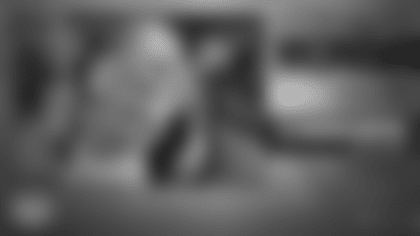The Washington Football Team has plenty of flexibility with the No. 19 pick in this year's NFL Draft. The work its front office did in free agency allows it to take a player from a position of need or the best available.
Those are not the only options, though; it could use the pick as part of a package to move up or as a selling piece to move back for more draft capital. General manager Martin Mayhew said the team is open to either, but moving up or down the board comes down to whether it can create value.
"Obviously, if you can move up and get a player that you value a lot and not lose a whole lot, that's what you want to do," Mayhew said. "You would move back if you could...get a lot in return for moving back. It's a lot that exists either way."
There is much to consider when weighing the merits of moving around the draft board. How much is Washington willing to give up in order to jump other teams? Are teams picking the way it predicted? And of course, there is the most important question: is the player it wants worth it? For those answers, Washington intends to have the same approach it has used all offseason: react to the options presented.
"I'd love to have all of our draft picks and get everything you need out of them, but sometimes that doesn't happen," head coach Ron Rivera said. "Sometimes you go up, sometimes you go back to get more."
The work put in to make those decisions actually begins before Washington is put on the clock. Mayhew normally likes to reach out to teams to gauge whether they would be willing to trade their picks. If they're willing to make a move, the next step is to ask how much it would cost.
Of course, teams are not going to flat out tell Washington their draft plans. That is why Mayhew and Rivera have executives like senior director of player personnel Eric Stokes and director of pro personnel Chris Polian working on evaluations of the teams around Washington in the draft to help make the best-informed decision possible.
"Really, you have to make a decision when you're at 19. Like Ron said, it's about what happens in front of you," Mayhew said. "Does it make sense for you if you're concerned about losing a guy, and does it make sense for us to go back if we feel like there's a large pool of guys available if we go back some? All of that is very fluid."
Mayhew believes players taken at the top of the draft should provide immediate impact, and there are certainly plenty of players available this year who fit that description. It is unlikely, though, that Washington would be able to move up and acquire one of them just by trading away the No. 19 pick. It would need to give up additional picks, three of which are in the top 100 this year, to make a potential trading partner feel as if it is getting equal compensation.
On the surface, it seems that would give Washington fewer options to improve its roster, but that is not the way Rivera looks at it. To him, all draft picks are capital, and you have to know how to use them.
"If you trade up and you have to use one of your draft picks to do this -- like, let's say you traded up to fourth -- to me, that person you end up drafting, part of that is he's partly your fourth pick," Rivera said. "People look at me and say: 'Well, you wasted your pick.' Well, no. You used that as capital to gain a player."
Conversely, Washington could look at what the teams in front of them have done and see that a lot of players it had high grades on are off the board. Or, as Mayhew pointed out, there could be a deep pool of players later in the draft. Should Washington find itself in that position, Mayhew thinks there are a number of talented position groups Washington could choose from on Day 2 or 3, namely at linebacker and receiver, both of which are viewed as positions of need for the team.
"I think it goes pretty deep with guys with various skillsets, too," Mayhew said of the receiver class. "I think there's some opportunity there. I won't speak to the weakness area; I don't think that makes a lot of sense. I think you can see a significant amount of wideouts into the second or third round that are quality football players that can go somewhere and make a major contribution. I think, defensively, there's a good number of linebackers that I think can be pretty productive players."
Washington's true luxury is that it doesn't feel as if it has to make any of those choices. The moves it made in free agency allow the team to do almost anything it wants. Rivera and the front office still don't want to reach for a player, but not worrying about the need to address certain positions allows them to explore other avenues.
The key for Washington remains for it to stick to the original plan of reacting to what the rest of the teams do, and Rivera's thoughts on the subject prior to free agency still ring true: "We're not desperate. There's no immediate need to, have to, got to, must."
"What we're looking to do is we're looking to build a winning, sustainable culture," he said. "We want to put the football team together the right way. A lot of good things happened last year. We did something that was a little unexpected, which I acknowledged. But at the same time, just because of that, I really don't think you throw the plan away and you start reaching and doing things you don't need to do right now. I think what you do is you continue to put the pieces of the puzzle in place, and hopefully build it the right way and put it together the way you need it to be."










